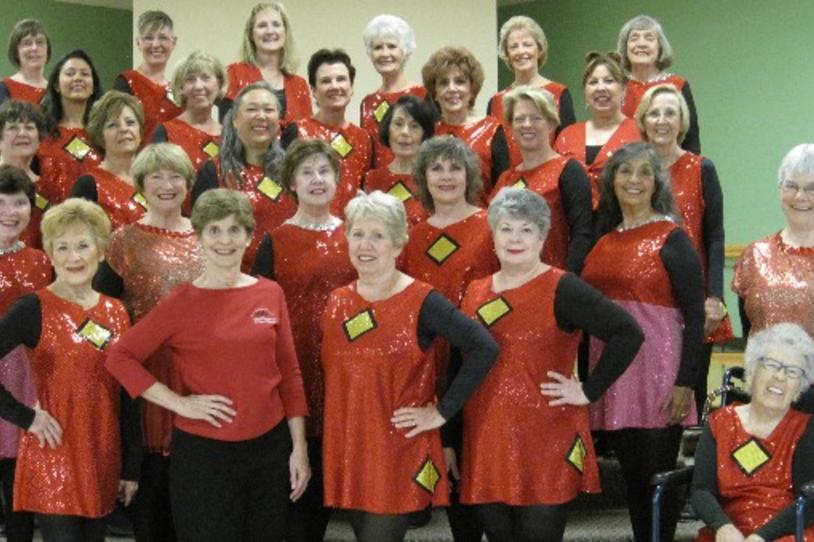
Rockyettes Group Photo 2014
(I'm in the 2nd row at the 1st position on the far left).
Kate Kelsall is president of DBS Voices of the Rockies and volunteers as a DBS advocate with individuals and their families. She was diagnosed with PD in 1996 and had DBS in 2005. Kate blogs at Shake, Rattle and Roll.
Yesterday was a great day. I've had so few great days lately with Parkinson’s that I’m excited to share my positive experience.
I take Broadway dance classes and perform with a group called the Rockyettes. One of the dances that we are learning to perform is our version of John Travolta’s dance toStayin’ Alive. While I know many of the dance steps, I am struggling to learn the sequence of these steps. So instead of dancing from the beginning to the end, I broke up the dance into five segments and tried to learn the dance in a different manner, e.g., in a. different order (e.g., segment 3, 5, 1, 4, 2) and with different cues for transitions and dance sequences.
Observing our group having trouble learning this dance and considering that we were performing it the next day, Ann, the dance instructor, offered to dance with our group to Stayin' Alive. We happily agreed to take her up on her offer. It gave us the confidence that we needed to learn the dance well before performing it on our own.
Ann had encouraged the dancers to smile while performing. The dancers provided all kinds of excuses on why it was impossible—“I can't multi-task” or “I can't think about my current dance step, my next dance step and smile all at the same time” or "I'm not a smiley kind of gal.” But during this performance, we miraculously cued ourselves by smiling to each other and the audience. Smiling became contagious.
And the best part of the day was that my voice worked almost all day. I was able to communicate with the dancers and talk to members of the audience after our performance. I had glimpses of my former self before Parkinson’s when I enjoyed talking and didn’t have to struggle to be heard or understood.
One of the dancers is a newbie to our group and found it challenging to learn the new dances. When I had observed tremendous improvement in her learning of the new dances, I told her that it was obvious she was working hard at it. She thanked me and hugged me, likely because I had noticed.
Lessons I Learned:
A great day doesn’t have to be a perfect day. In the past, if I had a great day for most of the day, but I had one setback, I would discount all the good aspects and call it a bad day. For example, during my last dance at the performance, my right hand started tremoring. In the past I would have been mortified, tried to cover it up, and said it was a terrible day. However, when my right hand shook at a recent performance, I tried to accept it and refocused on my dancing.
It is important that I verbalize supportive thoughts and observations instead of keeping them to myself. A few honest words of encouragement can brighten someone’s day.
It is necessary for me to analyze the components of a great day so that I can continue to create more of them. Despite having Parkinson’s Disease for 18 years, I can have a great day if it includes dancing, communicating and interacting with others and being creative. I’m looking forward to making many more great days, weeks, months and years.
Make it a great day.